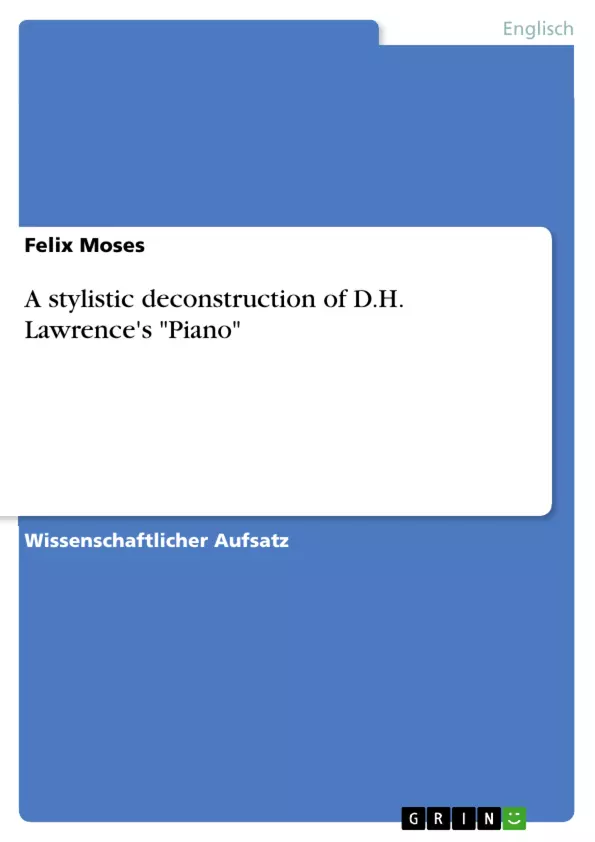Abstract: This article demonstrates the use of stylistics in deconstructing D.H. Lawrence’s Piano. A careful and complete analysis of one schematically foregrounded style marker the concrete countable noun ‘piano’ which has been incrementally repeated thrice, provides persuasive evidence of the overall value of stylistics as a “bridge discipline” (Leech 2) between linguistics and literary theory to enhance the appreciation of Lawrence’s poetic artistry and genius. Incremental repetition which by itself, “is probably the most readily identifiable of ballad characteristics,” (Bold 29) has been schematically foregrounded in the literary text Piano. The deconstructive analysis of this schematically foregrounded feature reveals the aporia and the impossibility of unravelling the various ambiguities which are easily overlooked in a commonsensical, liberal humanist “expressive realist” reading of the poem.
Inhaltsverzeichnis
- Abstract
- Einleitung
- Kapitel 1: Stilistische Dekonstruktion von D.H. Lawrences "Piano"
- Kapitel 2: Analyse des Vordergrunds des Zählnomen "Piano"
- Kapitel 3: Inkrementelle Wiederholung und ihre Funktion
Zielsetzung und Themenschwerpunkte
Dieser Aufsatz zielt darauf ab, die stilistische Dekonstruktion von D.H. Lawrences Gedicht "Piano" zu demonstrieren. Die Analyse konzentriert sich auf ein stilistisches Merkmal – die inkrementelle Wiederholung des Nomens "Piano".
- Stilistische Analyse von D.H. Lawrences "Piano"
- Dekonstruktion des Gedichts mittels der inkrementellen Wiederholung
- Analyse der Funktion von Wiederholung in der Lyrik
- Lawrences Beziehung zu seiner Mutter und deren Einfluss auf sein Werk
- Vergleich zwischen expressiver Realismus und poststrukturalistischer Dekonstruktion
Zusammenfassung der Kapitel
Abstract: Dieser Abstract beschreibt die stilistische Dekonstruktion von D.H. Lawrences "Piano", indem er die dreimalige inkrementelle Wiederholung des Wortes "Piano" analysiert und die Bedeutung der Stilistik als Brücke zwischen Linguistik und Literaturtheorie hervorhebt. Er deutet auf die Entdeckung von Mehrdeutigkeiten und die Grenzen eines expressiv-realistischen Lesens hin.
Kapitel 1: Stilistische Dekonstruktion von D.H. Lawrences "Piano": Dieses Kapitel beginnt mit einer kurzen Einführung in D.H. Lawrence als Dichter und Schriftsteller und führt die grundlegende These ein: Die stilistische Analyse, besonders die Betrachtung der inkrementellen Wiederholung von "Piano", enthüllt Lawrences poetische Kunstfertigkeit und Genialität, sowie seine komplizierte Beziehung zu den Frauen in seinem Leben, insbesondere zu seiner Mutter.
Kapitel 2: Analyse des Vordergrunds des Zählnomen "Piano": Das Kapitel analysiert die vierfache Verwendung des Wortes "Piano" im Gedicht und dessen inkrementelle Wiederholung ("Piano," "das Piano," "das klingelnde Piano," "das große schwarze Piano"). Es erklärt den Begriff der inkrementellen Wiederholung, seine Herkunft aus der Balladenliteratur, und wie Lawrence diese Technik verwendet, um den Kontrast zwischen Vergangenheit und Gegenwart, sowie zwischen seiner Mutter und anderen Frauen, hervorzuheben. Die wiederholte Verwendung des Wortes "Piano" dient als Leitmotiv, welches die emotionalen Zustände des Sprechers verdeutlicht.
Kapitel 3: Inkrementelle Wiederholung und ihre Funktion: Dieses Kapitel vertieft die Analyse der inkrementellen Wiederholung. Es vergleicht die Funktion der Wiederholung in traditionellen Balladen mit der Funktion in Lawrences Gedicht. Während in Balladen die Wiederholung zur Vorantreibung der Handlung dient, erzeugt sie in "Piano" einen Kontrast zwischen der glücklichen Vergangenheit und der gegenwärtigen emotionalen Belastung des lyrischen Ichs. Die unterschiedlichen Adjektive, die "Piano" modifizieren, werden als Schlüssel zur Darstellung dieser emotionalen Entwicklung analysiert.
Schlüsselwörter
D.H. Lawrence, Piano, Stilistik, Dekonstruktion, Inkrementelle Wiederholung, Expressiver Realismus, Poststrukturalismus, Mutter-Sohn-Beziehung, Poetische Kunstfertigkeit, Lyrik.
Häufig gestellte Fragen zu: Stilistische Dekonstruktion von D.H. Lawrences "Piano"
Was ist der Gegenstand dieser Arbeit?
Diese Arbeit analysiert D.H. Lawrences Gedicht "Piano" unter Verwendung stilistischer Dekonstruktion. Der Fokus liegt dabei auf der inkrementellen Wiederholung des Wortes "Piano" und deren Funktion innerhalb des Gedichtes.
Welche Ziele verfolgt die Analyse?
Die Analyse zielt darauf ab, die stilistische Gestaltung von Lawrences Gedicht aufzuzeigen und die Bedeutung der inkrementellen Wiederholung zu beleuchten. Es wird untersucht, wie diese Wiederholung zur Darstellung von Emotionen und zum Herausstellen von Kontrasten (z.B. Vergangenheit/Gegenwart) beiträgt. Die Arbeit vergleicht dabei auch unterschiedliche literaturtheoretische Ansätze (expressiver Realismus und poststrukturalistische Dekonstruktion).
Welche Kapitel umfasst die Arbeit?
Die Arbeit gliedert sich in drei Kapitel: Kapitel 1 bietet eine Einführung in D.H. Lawrence und die These der Analyse. Kapitel 2 analysiert die inkrementelle Wiederholung des Wortes "Piano" und dessen Funktion im Gedicht. Kapitel 3 vertieft die Analyse der inkrementellen Wiederholung und vergleicht deren Funktion in traditionellen Balladen mit der in Lawrences Gedicht.
Was ist unter „inkrementeller Wiederholung“ zu verstehen?
Die inkrementelle Wiederholung bezeichnet die wiederholte Verwendung eines Wortes, wobei jedes Mal weitere Modifikationen (z.B. Adjektive) hinzugefügt werden. Im Gedicht "Piano" wird das Wort "Piano" auf diese Weise schrittweise erweitert und verändert ("Piano," "das Piano," "das klingelnde Piano," "das große schwarze Piano").
Welche Rolle spielt die Mutter-Sohn-Beziehung in der Analyse?
Die Analyse deutet auf eine Verbindung zwischen der inkrementellen Wiederholung des Wortes "Piano" und Lawrences komplizierter Beziehung zu seiner Mutter hin. Das Gedicht wird als Ausdruck dieser Beziehung und der damit verbundenen Emotionen interpretiert.
Welche literaturtheoretischen Ansätze werden verwendet?
Die Arbeit kombiniert stilistische Analyse mit Elementen der Dekonstruktion. Sie vergleicht und kontrastiert den expressiven Realismus mit dem poststrukturalistischen Ansatz der Dekonstruktion.
Welche Schlüsselwörter charakterisieren die Arbeit?
Schlüsselwörter sind: D.H. Lawrence, Piano, Stilistik, Dekonstruktion, Inkrementelle Wiederholung, Expressiver Realismus, Poststrukturalismus, Mutter-Sohn-Beziehung, Poetische Kunstfertigkeit, Lyrik.
Wie wird die Bedeutung des Gedichts herausgearbeitet?
Die Bedeutung des Gedichts wird durch die Analyse der stilistischen Mittel, insbesondere der inkrementellen Wiederholung, erschlossen. Die Arbeit zeigt, wie die formale Gestaltung des Gedichts zu seiner Bedeutung beiträgt und Mehrdeutigkeiten offenlegt.
- Citation du texte
- Felix Moses (Auteur), 2010, A stylistic deconstruction of D.H. Lawrence's "Piano", Munich, GRIN Verlag, https://www.grin.com/document/162342



